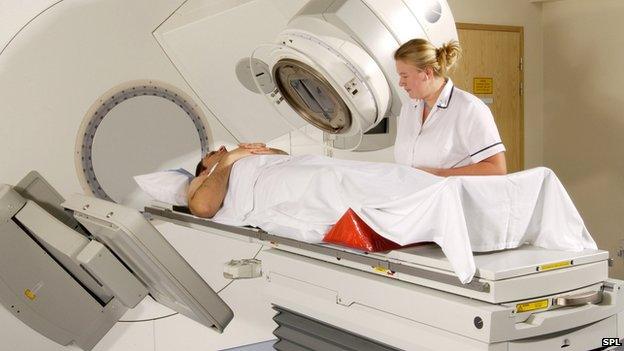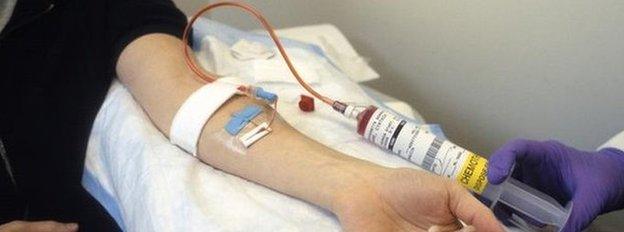Is cancer care at a crossroads?
- Published

Cancer is already the leading cause of death in the UK. And, thanks to the ageing population, it is estimated that soon half of us will get it at some point in our lives.
But with the number of cases on the rise, there are signs that all is not well with how the NHS is responding.
This week an analysis, external by Macmillan Cancer Support warned the UK was "stuck in the 1990s" in terms of survival rates.
The charity used data published in the Lancet, external last year to look at how the UK was performing on four types of cancer:
breast
lung
colon
stomach
It found our five-year survival in 2005-09 was at the level many of our European neighbours achieved in 1995-99.
This comes off the back of the news in February that cancer waiting time targets in England had been missed for a whole year, while a report by the Public Accounts Committee warned in March the NHS had "lost momentum".
It is perhaps no wonder then that Prof Michel Coleman, one of the country's leading cancer experts, this week wrote in the Lancet, external that "like the proverbial elephant in the room" the issues were too large to be ignored.
NHS England has already responded by setting up a taskforce to help devise a new cancer strategy by the summer. But why - when cancer is so common and such a priority - has this happened?
It should be said that it may not be quite as bad as it first seems from this flurry of stories.
It has been known for some time that the UK lags behind other countries - and there are even signs the UK is closing the gap for some cancers.
On breast cancer, the rate of improvement is faster than elsewhere, while on other cancers the UK is performing better than it is for the ones highlighted by Macmillan.
Whether that means survival rates in 2015 (data understandably always lags several years behind) are much better remains to be seen.
Nonetheless, it is clear cancer has been caught up in the pincer grip of rising demands and the squeeze on finances that is affecting many parts of the health service, says Cancer Research UK's Sarah Woolnough. She believes it is "vital" more is invested.
There is no centrally held data on how much is spent on cancer care, because responsibility is shared between different local and national bodies.
But research by Birmingham University for Cancer Research UK has shown that spending fell by 6% in real terms during the first half of the Parliament before rising again, with latest estimates suggesting close to £7bn goes on cancer services in England.
This has come at a time when the number of patients being urgently referred for tests has risen by 50% to 1.4 million a year in England. Similar rises are being seen elsewhere in the UK. This in turn has put huge pressure on the system and is clearly a huge factor in why waiting-time targets for treatment are being missed.
But basic funding and patient numbers do not tell the full story. The issues appear to be more complicated than that - and this is perhaps a reason why at this stage the state of cancer care does not look like it will feature as heavily in the election debate as say that of A&E departments or the care of the elderly.

Cancer in numbers

Cancer patients are often treated with chemotherapy, or doses of anti-cancer drugs
Cancer is the leading cause of death in the UK, with one in four deaths linked to the disease
In 1975, the lifetime risk of being diagnosed with cancer in the UK was one in four
By the 1990s, it had risen to one in three
By 2010, it was four in 10
More than 330,000 people were diagnosed with the disease in 2011
Half of those diagnosed with cancer survive for 10 years, but nearly a third die within a year

Late diagnosis is perhaps the most worrying problem for the UK. Despite all the awareness campaigns and emphasis on identifying cancer as soon as possible, a fifth of cases are only diagnosed after a trip to A&E.
A number of theories have been put forward for this. One is related to the role GPs have in the NHS. Compared with other health systems, they have a unique responsibility in that they effectively act as gatekeepers to care.
This is generally considered a real benefit and is a major reason the NHS is considered to be one of the most cost-effective systems in the world. But for cancer this may be an Achilles heel.
The average GP only comes across eight cases of cancer each year and - so the argument goes - are not always as quick as they should be in identifying symptoms.
This is why NHS England is rolling out projects to test giving patients the ability to bypass GPs and ask for hospital tests themselves as well as getting pharmacists more involved in referring patients.
But even that may not be enough to get to the bottom of why people present so late. Research published in the British Journal of Cancer has suggested there may be something in the British psyche that stops them coming forward when symptoms develop.
The study found Britons were much more likely to be embarrassed about coming forward or put off by fear they may be wasting the time of their doctor than people from other countries. When it comes to cancer, the problems may be more intractable than the headlines suggest.